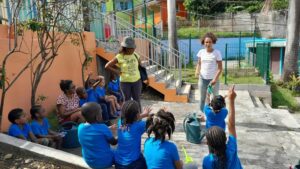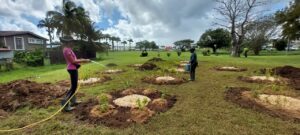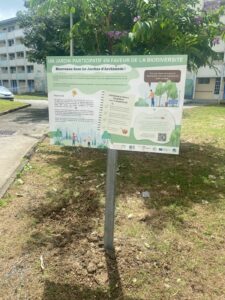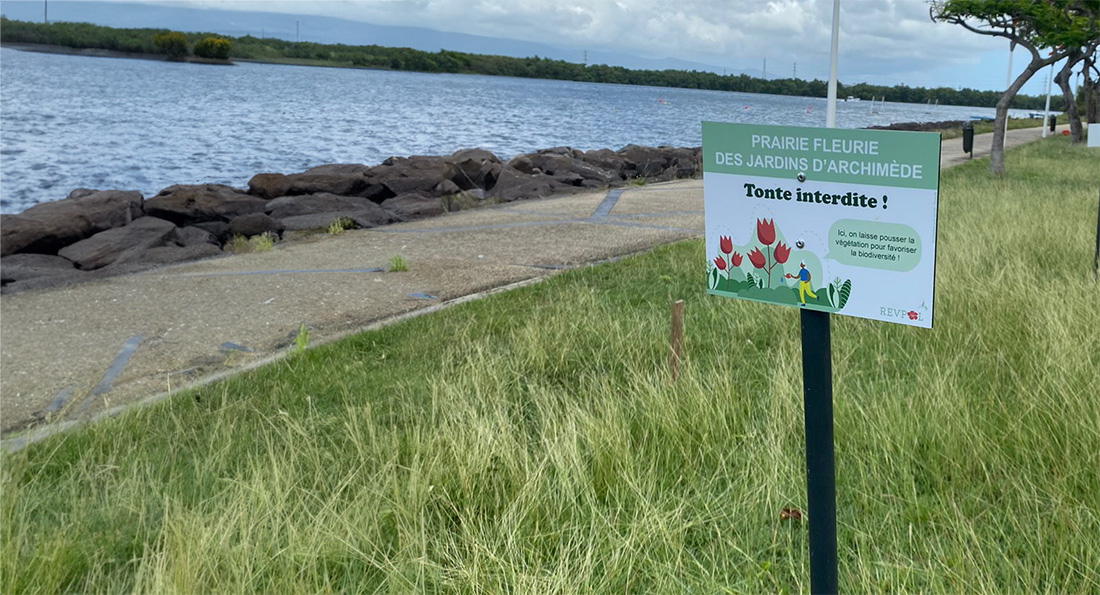Growing urbanization poses major challenges for the preservation of biodiversity. One of these challenges is to maintain biodiversity in urban environments, in particular through green spaces. In this context, the REVPOL project, dedicated to the REVegetation of urban and peri-urban areas in the West Indies in favor of POLlinators, has just come to an end. Begun in 2021, it consisted in a multifaceted approach to address this issue in Guadeloupe and Martinique.
The importance of green spaces in urban environments is undeniable, both for the well-being of citizens and for the ecological interest they provide. However, the widespread use of exotic plant species in these spaces, for both aesthetic and practical reasons, poses risks for local biodiversity. In particular, the decline of native plants in favor of exotic plants in cities could have negative consequences for pollinator assemblages.

Discovery workshop with children from a Pointe-à-Pitre school
Adopting pollinator-friendly urban greening practices is an important challenge in the context of the ecological transition of cities. First, we need to understand the link between plant species and pollinators, in order to acquire sufficient knowledge to make informed choices about planting and landscaping (choice of species, management methods, etc.). Secondly, we need to ensure that our recommendations are logistically and technically feasible, so that they can actually be put into practice. Finally, to ensure that sustainable methods are used on a long-term basis, both at community and individual level, we need to raise awareness among all the people involved, professionals as well as residents.
Based on these observations, the REVPOL project took several directions in the two partner cities: Le Lamentin in Martinique and Pointe-à-Pitre in Guadeloupe. Full-scale planting experiments were carried out in both areas, involving local populations and municipalities. Educational and awareness-raising workshops were organized for the general public and landscaping professionals. Finally, the project included a scientific component, with field observations and the implementation of a rigorous study protocol as part of a doctoral thesis linked to the project, aimed at better understanding the link between pollinators and plants, whether native or exotic.
A life-size experiment
In Pointe-à-Pitre, residents of a home, as well as schoolchildren, attended theoretical and practical workshops before taking an active part in planting at the two sites. These actions, broadcasted on television, were intended to have a lasting impact. The gardens are still in place, and educational panels have been installed in front of the plants to enable local residents to identify the species and learn more about them. Other materials, such as a large on-site educational panel summarizing the project, as well as leaflets and posters, have also been created for educational purposes.

Maintenance of plantations in Martinique
In the Lamentin, students from a Vocational Agricultural High School were involved in the creation of an experimental garden in the heart of the city. The garden was first prepared over a period of months: vegetation strategy adapted to the selected site, choice of species, articulation of the different plant strata, etc. The event was also covered by the media, with several reports broadcast on the radio.
In both cities, the plantings were carried out in close collaboration with the town’s teams, and with the help of local partners such as the Conservatoire Botanique National de Martinique and the Grenn Péyi plant nursery.
A better understanding of the link between plants and pollinators
The plantation experiments are intended to be instructive. In addition to learning about technical feasibility and the difficulties involved in maintaining the plants, the aim is also to understand the benefits of this new plant diversity. Empirical observations on the sites where the planting took place identified numerous species of pollinators, confirming the interest of the arrangements.
The project is supported by a doctoral thesis entitled “Dynamics of plant-pollinator interaction networks on an urbanization gradient in Martinique”. This research, which is still ongoing, is being carried out in a selection of private and shared gardens in Martinique. As an integral part of the project, the thesis aims to quantify plant-pollinator interactions in shared and private gardens in Martinique, assessing the richness, structure and temporal dynamics of interaction networks. The results will contribute to a better understanding of the composition of pollination networks, and to the formulation of specific management recommendations for the French West Indies.
Project achievements

Information panel installed on the plantation site in Guadeloupe
Preliminary experimental results have shown that the introduction of native plants enhances the diversity of pollinator assemblages, confirming the importance of native vegetation in urban spaces. These findings are supported by the thesis work.
Awareness-raising activities have also been crucial, actively involving local residents, schools and landscaping professionals. The aim of strengthening collective environmental awareness by emphasizing the importance of preserving pollinators and their habitats seems to have been achieved.
The enthusiasm generated by the project, be it from local authorities, professional teams, residents, schoolchildren, or journalists, is particularly encouraging. Indeed, while the project is coming to an end, its spin-offs continue. The gardens remain in place, now under the care of the town’s teams and local residents. Appropriate educational material has been created to give residents and municipalities the key information they need to keep the momentum going. The knowledge acquired, which will eventually be valorized in the form of scientific articles and a doctoral thesis, paves the way for sustainable practices to preserve biodiversity in urban and peri-urban environments in the French West Indies.
Learn more about the REVPOL project: https://www.caribaea.org/en/our-projects/research-and-education-programs/revpol/
The REVPOL project is carried out with the financial support of the European Union – NextGeneration EU, France Relance and the Office Français de la Biodiversité, whose contribution amounts to €143,160.00, i.e. 82% of the total amount.


